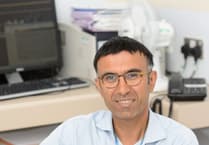A FARNHAM consultant is backing a cancer awareness campaign and encouraging women to ‘make some noise’ in a bid to make the symptoms of ovarian cancer better known to everyone.
Ovarian cancer is the fifth most common cancer among women in the UK with more than 7,000 women diagnosed each year with 4,300 deaths annually. One in 50 women will have ovarian cancer in their life time.
But because symptoms are not well known or often mistaken then it is usually discovered in the later stages when successful treatment is much more difficult.
Now, as part of Ovarian Cancer Awareness Month which runs throughout March, Nick Elkington a consultant gynaecologist at Spire Clare Park Hospital in Farnham, has called on women to be constantly on the lookout for possible symptoms – urging them not to dismiss them as ‘tummy troubles’ or period pains.
He said: “When women are diagnosed in the early stages of ovarian cancer they have a 90 per cent chance of surviving for more than five years but this reduces to even less than 40 per cent when diagnosed in the later stages so it is important they know what symptoms to look for and that they make their GP aware of those symptoms as soon as possible.
The four main symptoms to look out for are persistent bloating or increased stomach size; difficulty eating or feeling full quickly; needing to urinate more frequently; and persistent stomach pain.
“My advice to any woman suffering from any of these symptoms is to go to their GP and discuss the matter thoroughly. Women must feel confident that when they visit their GP with any of the symptoms mentioned above they will be examined with the possibility of ovarian cancer in mind” added Nick.
There are now genetic tests available to assess the risk of developing ovarian cancer. In certain situations it may be appropriate to undergo a keyhole surgery to remove ovaries to reduce the risk.
The majority of cases occur in women over the age of 40, however some types of ovarian cancer do appear in women from the age of 20 onwards. There is a slightly increased risk to women who have not had children, or have not breastfed and being overweight may also increase risk.




